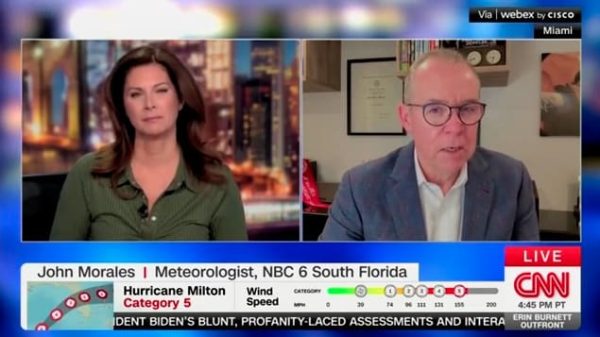As Donald Trump spreads misinformation about Democrats not helping people impacted by deadly Hurricane Helene, there’s a reason he may be antsy: those victims are mostly Republicans.
The Sun Belt battleground states of North Carolina, Georgia and Florida are taking a pummeling from two megastorms less than a month before Election Day. And history shows: a hurricane a month before a major election depresses turnout. This year, many of the hardest-hit regions are Trump strongholds.
In Western North Carolina, 25 counties were included in the “designated disaster area” ravaged by Helene. According to data, voters in those areas are overwhelmingly independent and Republican. In 2020, they supported Trump by a wide margin, helping him win the state. If they don’t vote this time around, Kamala Harris supporters could easily tip the toss-up state into her column.
“Our hearts are with the North Carolinians impacted by Hurricane Helene,” said Dory MacMillan, communications director for the Harris campaign’s North Carolina operation. “And we are working closely with our legal and voter protection teams and the N.C. Democratic Party to ensure that every eligible voter is able to safely make their voices heard in this election.”
Elections officials are also doing what they can to make sure people can vote. The North Carolina State Board of Elections passed a slew of emergency measures this week for counties devastated by Helene. In these areas, local officials can modify early voting hours and sites in the ways they deem necessary. Early voting sites are in the process of installing porta-potties, washing stations, and generators.

STORM-HELENE/
The aftermath of Hurricane Helene, in Swannanoa, North Carolina, has the potential to reshape an election which polls suggest is tighter than any in recent history.
Eduardo Munoz/Reuters
“Our hope is that everybody who’s eligible to vote in those areas will be able to do so,” the state’s Board of Elections public information director Patrick Gannon told the Daily Beast. “There will be options.”
Mail-in voting options could help, he said, with elections offices still sending and receiving mail, but for voters whose homes were destroyed, mail may be hard to access.
“The place where there would be issues would be if somebody’s house is no longer there,” he said.
Displaced hurricane survivors in North Carolina can request absentee ballots wherever they’re staying and return them to any county board of elections office in the state. Still, for the tens of thousands of people driven from their homes, voting is likely to take a back seat to repairing their lives.
Things may not be much better for the Trump campaign in Georgia and Florida, where the hurricane devastated mostly rural and red areas.
With Hurricane Milton bearing down on the Sunshine State, the full impacts of hurricane season on the election are still unfolding. Ahead of the storm, which has shown wind speeds up to 180 mph, President Joe Biden has postponed a trip to Germany and Angola. Trump has delayed a roundtable with Latino Americans. The mayor of Tampa, a city that hasn’t been hit directly in more than a century, told people who don’t evacuate, “You are going to die.”
Miles Taylor, the Trump administration staffer who once slammed the former president as “Anonymous” put it more bluntly, writing on X, “This has potential to wreak havoc—including on the election.”
But Milton could tip the election the other way. Tampa, where the storm is likely to make landfall, is a repository of Democratic votes in a sea of red counties. If it depresses turnout there, that could work to Trump’s advantage.











